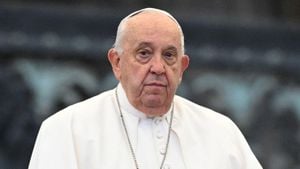The G20 Foreign Ministers Meeting, held on February 20 and 21, 2024, at the Nasrec Exhibition Center in Johannesburg, South Africa, underscored growing geopolitical tensions and their impact on global cooperation. The summit, which was marked by stark divisions, particularly surrounding the war between Russia and Ukraine, sought to address the urgent challenges facing nations, from climate change to food insecurity.
South African President Cyril Ramaphosa, who opened the event, warned of the fragility of global coexistence. He stated, "Las tensiones geopolíticas y la creciente intolerancia, los conflictos y las guerras, el cambio climático, las pandemias y la inseguridad energética y alimentaria amenazan la ya frágil coexistencia mundial," underscoring the interconnected nature of these global issues.
During the opening remarks, Ramaphosa emphasized the importance of collaborative solutions, urging member nations to solidify their commitment to multilateralism. Despite the intent, the meeting encountered significant obstacles due to differing viewpoints among the major powers involved, leading to concerns over the discussions' efficacy.
Foreign Minister Ronald Lamola reiterated these sentiments, stating, "La reunión reiteró que todos los estados deben actuar de manera coherente con los pueblos y principios de la carta de la ONU," highlighting the need for unified actions aligned with international law. His remarks reflected a collective acknowledgment of the pressing need to work together to vindicate the principles established by global governance structures.
The shadow of the Ukraine conflict loomed large throughout the discussions, with ministers, including Sergey Lavrov of Russia and Kaja Kallas of the European Union, acknowledging the discord surrounding the issue. During bilateral meetings, Lavrov argued against the western narratives, claiming, "No veo un interés real para llegar a esa paz," as he criticized the West's role. This divergence showcased the ideological schisms apparent within the G20, as various leaders advocated for different paths toward peace.
To complicate matters, the absence of significant US diplomatic representation, particularly the lack of Secretary of State Marco Rubio, was noted. The US was represented by its interim ambassador, Dana Brown, which some analysts indicated could diminish the country's influence within the group. According to Ramaphosa, the lack of high-profile attendance did not derail discussions but added to the challenges faced by the assembly.
The meeting concluded without concrete advancements, with member states unable to establish clear paths toward resolution for conflicts mentioned, including situations framed by Lamola as urgent: the wars raging in Ukraine, Gaza, and Sudan. Interestingly, the merged statements reaffirmed support for peaceful negotiations, but discrepancies remained about who should be at the negotiating table.
Leaders proposed inclusive dialogues involving all stakeholders, including Ukraine, yet differing positions on the conflict’s origins and potential resolutions complicated the endeavor. Lamola spoke firmly on this, stating, "Cualquier proceso de negociación de paz debe ser inclusivo y que esa inclusividad debe incluir a Ucrania de manera muy clara."
The two-day summit officially closed, yet the fallout from the discussions is expected to persist as members head to the G20 leaders' summit scheduled for November, where broader conceptual frameworks and strategic allocations will be evaluated. The outcomes of this Foreign Ministers Meeting set the stage for continued dialogue amid uncertainty, and it remains to be seen how the gathering's findings will influence future G20 engagements.
Reflecting on the overall meeting, Lamola noted the urgency for cooperative efforts, stating, "las actuales ‘divisiones geopolíticas’ generan un ‘clima de desconfianza’ en el mundo," acknowledging the risk such divides pose to global progress. With tensions running high and international stability at stake, the G20's future role as mediators and leaders will be put to the test as they navigate these turbulent waters.



